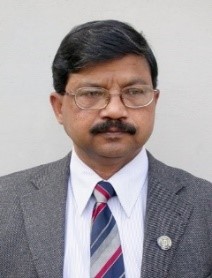
Prof. Dharani Dhar Patra
Seacom Skills University, Bolpur, India
Title: Phytoremediation of heavy Metal Polluted Soils with Aromatic Crops: Green and Sustainable Approach
Abstract:
Polluted soils, also designated as contaminated soil, is defined as the presence of man-made toxic substances in soil. Heavy metal contamination is one of the major abiotic stresses and a global due its characteristic toxicity and environmental persistence. It is threatening sustainable agricultural production and health of millions of people. Contamination of soil by heavy metals occurs naturally and through anthropogenic activities. Heavy metal concentration beyond a certain limit degrades the soil, the quality of the produce and ultimately the human and animal health. Some of the major sources of heavy metals are mining and landfill, city waste, factory effluents etc.
The toxic metals accumulated in the bodies of living organisms can be tetratomic, mutagenic and endocrine disrupters. The potent heavy metal pollutants are chromium, cadmium, lead, mercury, nickel, selenium etc. reactive oxygen is produced due to heavy metal stress in living being resulting in oxidative damage and health related adverse effect. Heavy metals are the natural components of earth crust and cannot be degraded. Several physical, biological and chemical methods are commonly used for decontamination of metals. Phytoremediation is presumably the best technique for remediating heavy metal toxicity; it is safe, ecofriendly green technology. Our group at CSIR-CIMAP, India conducted field and greenhouse studies using essential oil bearing hyperaccumulating plants. Such plants are used for higher uptake of metals from the polluted soils without affecting the plant metabolism and products. Plant through several biophysical and biochemical processes viz. adsorption, transport, translocation and hyperaccumulation remediate heavy metals from the soil. Such plants must have specific adaptation properties to survive under toxic metals and metalloids and they must be metallophytes. Some hyperaccumulating food crops are often used for phytoremediation viz. Helianthus annus, Brassica napus, Zea maize etc. The problems of such crops is that the metal accumulated could be channelized to human and animal being and are not safe. The aromatic crops viz. vetiver ( Chrysopogon zizanioides), Lemongrass ( Cymbopogon flexusosus), Palmarosa ( Cymbopogon martini) could be safely used for phytoremediation. Such proposition fulfils two-pronged advantages viz. hyperaccumulation and production of essential oil from the fresh herbs by hydro-distillation. Such crops are tolerant to toxic metals, fast growing, produce high biomass, have extensive root system and accumulate high amount of metals.
Such green technology represents a secure and feasible approach for remediating pollutants and offering biological economic benefits through production of high value essential oil with minimum inputs, least risks and maintenance.
Keywards: Aromatic crops, soil pollution, heavy metals, phytoremediation, Contamination
Biography:
Prof Dharani Dhar Patra, presently working as the Director of School of Agricultural sciences, Seacom Skills University, Bolpur,West Bengal, India (2020-2023), has been the Vice Chancellor of Bidhan Chandra Krishi Viswa Vidyalaya, Kolkata, India (2016-2020) and Professor-cum-Chief Scientist (Natural Resource Management) at CSIR-Central Institute of Medicinal and Aromatic Plants, Lucknow, India ( Under Ministry of Science and Technology, Government of India, New Delhi, India (1987-2015). Prof Patra did his Graduation and post-Graduation from from BCKV, India and did his PhD from Indian Agricultural Research Institute, New Delhi, India (1978-1982) and then went to Rothamsted, UK for post-doctoral research and subsequently joined Rajasthan Agricultural University, as an Assistant Professor in Natural Resource Management (1982-1987).
Prof Patra is a recipient of several Awards viz.National Fellowship, 1971; FAI Silver Jubilee Award, 1980; FAI Gold Medal, 1983; Commonwealth Fellow, 1983; STA Fellow, 1999;Mint Technology Award, 1999; PPIC (Canada) - FAI Gold Medal, 2000; FICCI Award 2005; 12th International Congress Commemoration Award, 2005; UPCAR Eminent Scientist Award (NRM), 2006; ISCA Platinum Jubilee Award 2008. Golden Peacock Eco-Innovation International Award, 2008. CSIR S&T Award for Rural Development, 2008.CSIR-Best Scientist Award on Agri-entrepreneurship, 2015
Prof Patra is a Fellow of several Academies viz. National Academy of Sciences (FNA Sc), India; Fellow, Indian Society of Soil Science (FISSS), New Delhi, India, National Academy of Agricultural Sciences (FNAAS), New Delhi. India; Fellow, West Bengal Academy of Science & Technology, Kolkata India; Fellow, Indian Society of Agronomy (FISA), New Delhi, India; NY Academy of Sciences, USA.
Prof Patra’s research area of interest areSoil Science & Agricultural Chemistry, Isotope technique in soil and plants, Agrotechnology of medicinal and aromatic crops, Soil-plant-environment continuum; Utilization of salt affected marginal lands,Phytoremediation of heavy metal polluted soils. Industrial Microbiology, Soil Ecology, Nutraceuticals, etc.
He has published 204 research papers in peer reviewed journals, 42 Symposia/Seminar papers, 13 Reviews (including book chapters), 15 Popular scientific articles, 19 Agrotechnology Bulletins, 09 Patents, 03 Technologies and has supervised 23 students for their PhD and Post-doctorate Research.